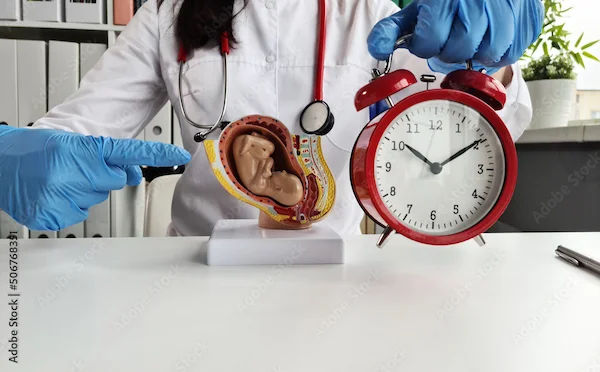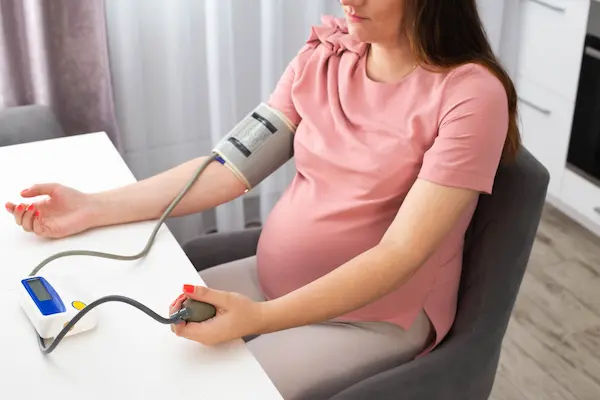IVF and Heart Disease: A Essential Guide to Safe USG Monitoring
Learn how to safely navigate IVF with pre-existing heart disease. Discover the role of USG monitoring, essential precautions, and expert guidance for a safe pregnancy journey.

Written by Dr. D Bhanu Prakash
Reviewed by Dr. Mohammed Kamran MBBS, FIDM
Last updated on 13th Jan, 2026

Introduction
The journey to parenthood through in vitro fertilisation (IVF) is filled with hope, meticulous planning, and a series of critical medical procedures. Central to this process is the use of ultrasound (USG) to monitor ovarian response and guide treatment. However, for women with pre-existing heart disease, this journey requires an additional, vital layer of caution and specialised care. This guide is designed to navigate the unique challenges at the intersection of IVF treatment and cardiac health. We will explore why the standard IVF process can strain the cardiovascular system, how USG monitoring plays a role, and the essential steps you must take with your medical team to ensure a safe path forward. Your dream of motherhood is achievable, and it starts with informed, careful planning.
Understanding the IVF Process and the Role of Ultrasound (USG)
The IVF process is a carefully choreographed sequence of events aimed at creating embryos outside the body. Ultrasound imaging is the workhorse technology that allows doctors to visualise this process in real-time, making it indispensable. It’s used to track the development of ovarian follicles—the fluid-filled sacs that contain eggs—and to assess the uterine lining to ensure it's optimal for embryo implantation.
What is Transvaginal Ultrasound (TVUS) in IVF?
Unlike abdominal ultrasounds, IVF monitoring primarily uses transvaginal ultrasound (TVUS). A slender probe is inserted into the vagina, providing high-resolution images of the ovaries and uterus located nearby. This procedure is typically painless and lasts only a few minutes. While the procedure itself doesn't pose a direct risk to the heart, the findings it reveals dictate the next steps in treatment, which do have significant cardiac implications.
The Crucial Monitoring Steps: From Follicles to Transfer
Baseline Scan: Done at the start of the menstrual cycle to check for cysts and measure resting follicles.
Stimulation Monitoring: Scans every 2-3 days during ovarian stimulation medication to measure follicle growth and number.
Trigger Shot Decision: The USG determines the perfect timing for the "trigger shot" that finalises egg maturation.
Egg Retrieval Guidance: USG visually guides the needle during the egg retrieval procedure.
Transfer Preparation: Scans check the uterine lining thickness and pattern before an embryo is transferred.
This constant USG monitoring is what allows for a tailored approach, which is the cornerstone of safety for women with a heart condition.
Health topic carousel:
Doctor's speciality: Cardiologist, Fertility Specialist, or Obstetrician-Gynaecologist
Text: Consult a Specialist for the best advice
Why Heart Disease Changes the IVF Equation
For a woman with a healthy heart, the physiological changes of IVF are manageable. But for those with underlying heart disease—be it congenital issues, valve problems, cardiomyopathy, or a history of heart failure—the process can introduce serious risks. The concern isn't the USG itself, but the hormonal changes and physical stress triggered by the treatment it guides.
The Cardiovascular Stress of Pregnancy
It's crucial to understand that IVF is a precursor to pregnancy. Pregnancy naturally increases blood volume by 30-50%, elevates heart rate, and increases cardiac output. This is a significant strain. Undergoing IVF is the first step into this high-demand state, and your heart must be prepared to handle it. A successful IVF cycle that leads to pregnancy must be planned with this end goal in mind.
How IVF Medications Directly Impact the Heart
The fertility medications used to stimulate the ovaries, primarily estrogen, cause fluid retention and can alter how the body handles electrolytes. This leads to:
Increased blood volume, forcing the heart to work harder.
A higher risk of thrombosis (blood clots), a critical concern for women with certain artificial valves or arrhythmias.
Potential triggering of arrhythmias (irregular heartbeats) or worsening of heart failure symptoms like shortness of breath and swelling.
This is why the pre-IVF cardiac evaluation is not just a formality; it's a lifesaving prerequisite.
Pre-IVF Cardiac Evaluation: The Non-Negotiable First Step
Before any fertility medications are prescribed, a comprehensive cardiac assessment is mandatory. This evaluation determines if your heart can safely withstand the stresses of both IVF and pregnancy.
Essential Tests for Women with Heart Conditions
Your cardiologist will likely recommend:
Echocardiogram: An ultrasound of the heart to assess its structure, function, valve health, and pumping capacity (ejection fraction).
ECG (Electrocardiogram): To check for arrhythmias.
Stress Test: To see how your heart performs under physical exertion.
Blood Tests: To assess overall health and biomarkers like BNP, which can indicate heart strain.
Consultation with a high-risk obstetrician (Maternal-Fetal Medicine specialist) is also essential.
The Multidisciplinary Team: Your IVF-Heart Safety Net
Safe treatment requires a team approach. Your fertility specialist, cardiologist, and high-risk OB/GYN must communicate and create a shared care plan. If you are considering IVF and have a known heart condition, your first step is to consult with a cardiologist to discuss your specific risks and get clearance. Apollo24|7 can connect you with leading cardiologists for an online consultation to begin this vital assessment.
Health topic carousel:
Lab Test: Blood Tests, Stress Test, ECG, and Echocardiogram
Text: Get Your Health Assessed
Tailored IVF Protocols for Cardiac Patients
A "one-size-fits-all" IVF approach is dangerous for cardiac patients. The goal is to achieve a pregnancy with the least amount of physiological stress.
The Case for Milder Stimulation
Aggressive stimulation protocols aim for a high number of eggs but also cause a dramatic rise in estrogen and significant fluid retention. For a vulnerable heart, this is risky. Specialists often use:
Mild Stimulation Protocols: Lower doses of medication to produce fewer, high-quality eggs with a gentler hormonal shift.
Antagonist Protocols: These can help prevent severe ovarian hyperstimulation syndrome (OHSS), a condition causing rapid fluid shifts that are particularly dangerous for cardiac patients.
The Role of Frozen Embryo Transfer (FET)
A "freeze-all" strategy is almost always recommended. This means all viable embryos are frozen after the egg retrieval. The embryo transfer is done in a separate, later cycle. This allows:
Your body will fully recover from the stimulation cycle.
Your hormone levels return to normal.
Doctors prepare your uterine lining with controlled, lower-dose estrogen, which is much safer for the heart than the high levels from stimulation.
Conclusion
Navigating IVF with a pre-existing heart disease is undoubtedly complex, but it is a path that can be traveled safely with meticulous planning, expert care, and informed decision-making. The key lies in understanding that the USG is your guide, but the treatment it monitors requires significant customisation. By insisting on a comprehensive pre-IVF cardiac evaluation, assembling a dedicated multidisciplinary medical team, and opting for a tailored, patient-specific protocol, you dramatically increase your chances of a successful and safe outcome. Your journey to motherhood is precious. Empower yourself with knowledge and partner with experts who prioritise your health every step of the way. If you have a heart condition and are considering starting a family, book a consultation with a cardiologist on Apollo24|7 to begin this important conversation.
Health topic carousel:
Doctor's speciality: Cardiologist, Fertility Specialist, or Obstetrician-Gynaecologist
Text: Consult a Specialist for the best advice
Frequently Asked Questions (FAQs)
1. Can I ever do IVF if I have a history of heart failure?
A. It depends on the severity and current function of your heart. This is a decision for your cardiologist and fertility specialist. It requires extensive testing, likely including an advanced echocardiogram and stress test, to determine if your heart can handle the increased demand. In some cases, it may be deemed too high-risk.
2. Does the transvaginal ultrasound procedure affect my heart condition?
A. No, the transvaginal ultrasound procedure itself is local and does not place any direct stress on the heart. It is a safe imaging technique for women with cardiac issues. The concern is always the subsequent treatment steps based on the scan's results.
3. What are the specific heart symptoms I should watch for during IVF stimulation?
A. Be acutely aware of new or worsening symptoms like unusual shortness of breath (especially at rest), heart palpitations or a racing heartbeat, chest pain or tightness, extreme fatigue, and significant swelling in your hands, legs, or feet. Report these to your doctor immediately.
4. Is a natural cycle IVF safer for my heart?
A. Natural cycle IVF (using no or very minimal medications) significantly reduces the hormonal impact on your cardiovascular system and is often a much safer option. However, it may have lower success rates per cycle. This is a key discussion to have with your fertility team.
5. Who makes the final decision on whether I can proceed with IVF?
A. It is a shared decision between you and your doctors. However, clearance from your cardiologist is the essential gatekeeper. If your cardiologist determines the risk to your health is unacceptably high, a responsible fertility specialist will not proceed with treatment.




